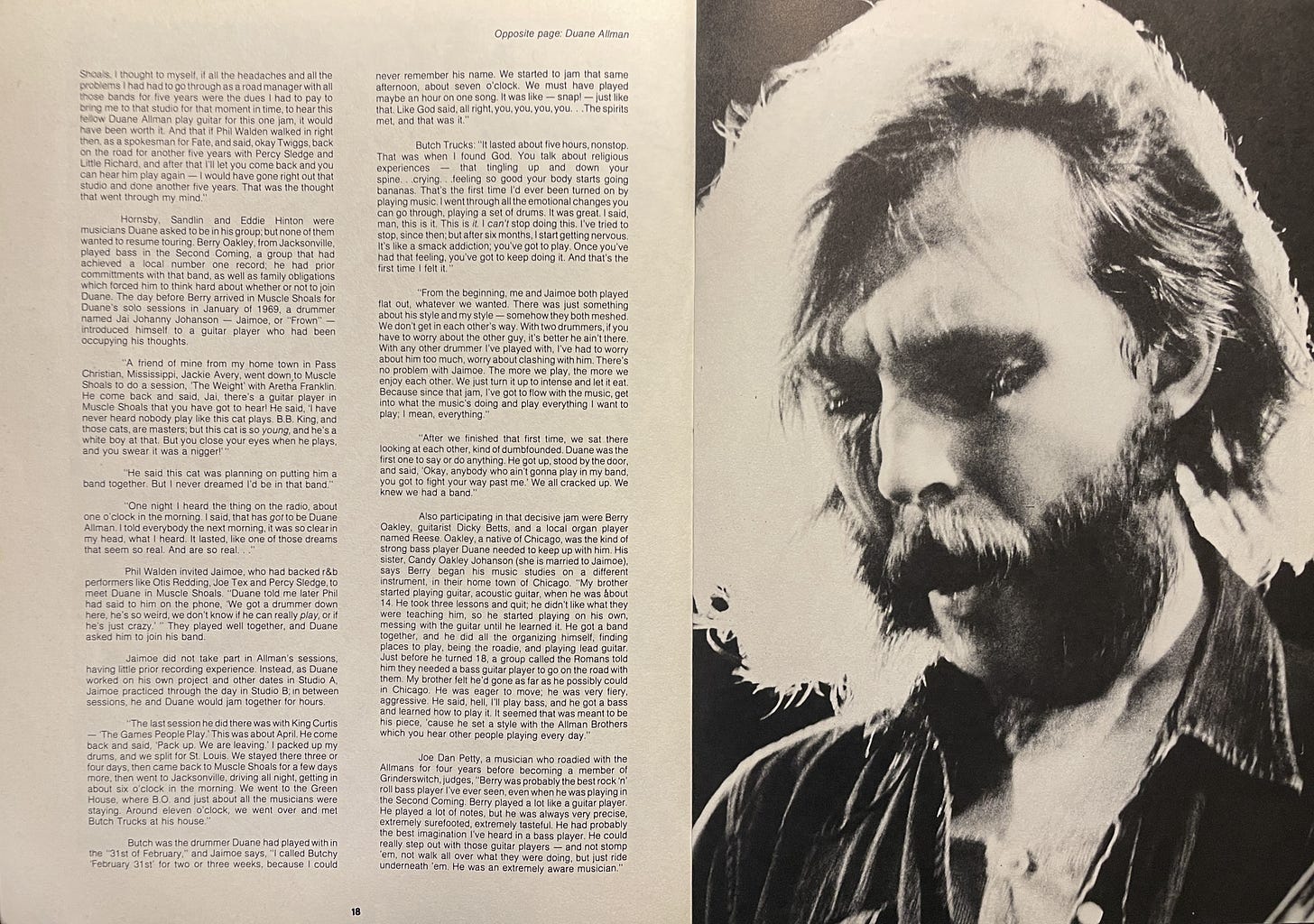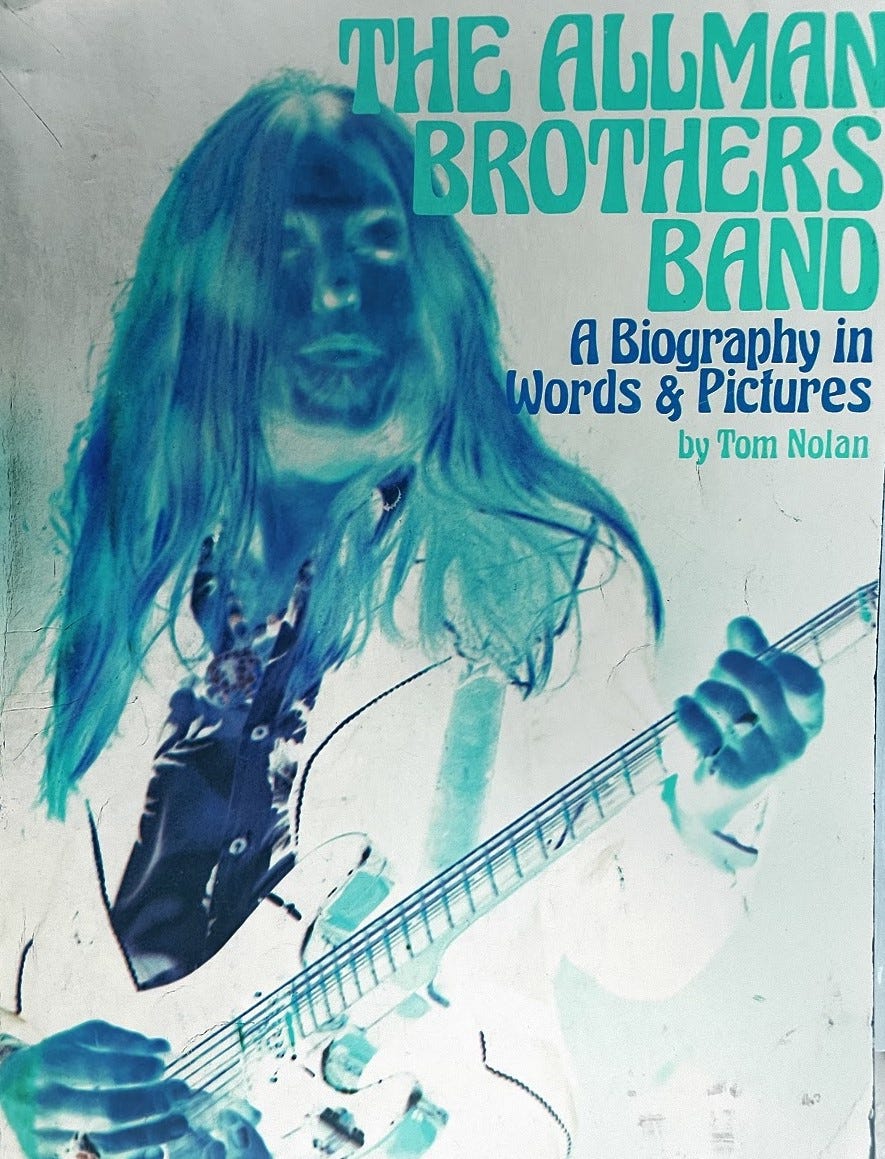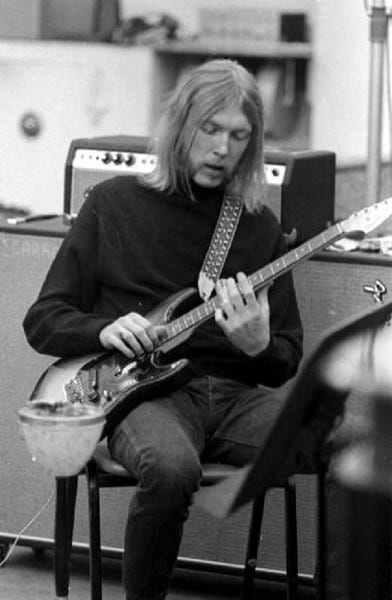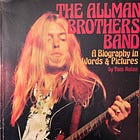“He did not look like your ordinary Muscle Shoals regular.”
Part 3 of an annotated read of the first Allman Brothers Band book
[This is an edit of a post that was previously available only to paid subscribers of Long Live the ABB ORIGINALLY PUBLISHED MAY 2024]
Welcome back to Long Live the ABB! Today, May 31, is National Smile Day. I don’t usually join in these random celebrations, but it seems we all could use a little more smiling in our lives right now. Herewith, a photo of Berry Oakley from p153 of Play All Night!1 I quoted my best friend Troy in the caption2
“The joy on his face reflects how I feel when I listen to him play.”
Things that piqued my interest:
My friend Art3 sent along this video that inspired my own post a while back Interview with Gregg from 1982/3.
This one speaks for itself. “Duane Betts Says Playing Late Dad Dickey Betts’ Music Has New Meaning Now: ‘Really Treasure It ‘Cause It’s Precious’”4
The Allman Brothers Band and Jackson, Alabama. “Alabama coffee shop’s cool connection to the Allman Brothers Band” I spoke at the dedication of the historical marker at this site in April 2024 and recorded this video where the arrest happened.
Add Slash to my list of 80s/90s rock musicians who’ve named dropped the Allman Brothers Band.5 “Slash talks new music, making Appetite for Destruction, Allman Brothers influence”
The Allman Brothers Band: A Biography in Words and Pictures Part 3
These are the pages I’m commenting on today6
Full text of book posted here
Text picks up at the top of the second column.
Dr. B’s Marginalia
The original text looks like this.
My comments look like this.
Previously on Long Live the ABB
I ended my last post with Jerry Wexler talking about Duane.
“We were good friends. He would come to my house. He liked my wife and kids. We’d shoot pool, or go out to the boat, or play music; he always played, whenever he came, with whoever was there. It was some of the best music you would want to hear. Maybe outdoors, on the deck over the bay, late on a quiet summer night; Duane singing, with he and Delaney picking on acoustic, and maybe Bonnie on piano in the next room.”
Enter Phil Walden
Duane was beginning to earn a national reputation. Certain disc jockeys around the country made a point of informing their listeners it was Duane Allman playing guitar on that song by Wilson or Aretha, King Curtis, or Boz Scaggs. A Georgia man named Phil Walden, who had managed the late Otis Redding’s career, became convinced Duane Allman was destined for greater things than session work in Muscle Shoals, an opinion Duane made no secret of sharing.
Duane was definitely plotting something beyond session work. “In about a month,” he wrote Donna Roosman in December 1968, “I’m going to start getting my gigging band together. I can hardly wait. I love working in the studio, and it is very valuable experience, but I know I was born to play for a crowd, and I'm really itching to get started.”7
As Rick Hall remembered, “Phil kept saying, ‘I’m telling you he’s going to be a superstar. Hang onto him and go in the studio and turn on the machine and let him hang out back there and screw around, and a year from now you’ll make $1 million.”
Marginalia available thanks to paid subscribers of Long Live the ABB.
Critic and now record producer Jon Landau8 met Duane towards the end of his stint at FAME; he remembers Allman in that conservative Southern environment as seeming, “Very, very different.”
“He had this incredibly long hair, down to his ass back then. He wore red-white-and-blue tennis shoes, and he basically did not look like your ordinary Muscle Shoals regular.”
The musicians at FAME reflected the buttoned-down, conservative nature of Muscle Shoals.
To bassist David Hood, “Duane was a freak.” Jimmy Johnson called him “the first free-spirited person I met.”
Walden’s initial idea was to record a Duane Allman solo album. Johnny Sandlin, Paul Hornsby, and Berry Oakley were players chosen to back him up on the Hall-produced effort, which was scrapped before completion.
Landau heard the results. “They were playing these tapes, one of which was nine minutes long. Now, Rick Hall’s thing is not nine-minute songs. The tape was not that good; it was just a long blues, and it was just starting to take shape. On the other hand, it was there, you could definitely hear it.”
Rick Hall (not Phil Walden) produced Duane’s solo sessions from Muscle Shoals in January, February 1969. And it was definitely Duane who engaged Sandlin, Hornsby, and Oakley for the sessions.
None of the tracks Duane recorded are particularly distinctive except that they were the first recordings to include Duane and Berry.9 Jaimoe was there, but he was unfamiliar with studio work and sat out the sessions altogether.
Only one of the songs was an original, Duane’s tongue-in-cheek “Happily Married Man.” Howlin’ Wolf’s “Goin’ Down Slow” was another step closer to the Allman Brothers Band sound, a blues standard with urgent, stinging electric guitar. Neither song made the Allman Brothers Band repertoire.
And both Hornsby and Sandlin declined Duane’s offer, seeing no future in his new project. “We’d just spent two years in Hour Glass and those were the stepping stones,” Hornsby recalled. “I’d done stepped on that stone, and I was just trying to move on.”
Said Sandlin, “There had ever been a rock band that had broken out of the South,” he said. “Anybody from the South that made it had to go to L.A. or New York, and I definitely didn’t want to go that route. We’d just been through it, and I was just burned out from it.”
[Landau]
“Duane and Rick got along, but you could see they didn’t really communicate very much. It was obvious that Duane and Johnny were into a whole different perspective than what Rick envisioned. Phil, though, had an instinctive feel for what Duane could do.”
This is one of the more interesting interludes in the book. Hall was a dynamite producer who had recorded a string of hits. He also had a keen eye for musicians, eventually building three different rhythm sections at FAME.
But he and Duane were a poor fit. Rick Hall, Landau said, was “very dark, very intense, very old-school, very straight.” Duane was intense, but that was where the comparisons ended. On January 5, 1969, he shared his frustrations in his diary: “First part of session terrible. Couldn’t get Rick to accept new idea for guitar parts. . . . What a drag.”
Said Hall years later, “‘Dog’ and I weren’t writing the same book, but I was totally into his free spirit, never-say-die attitude, and the mind-boggling things he could do with his guitar.”
Landau continued
“Duane was a really predominant personality even then; really energetic, self conscious. He acted like a star. Duane was one of the three or four most egotistical people I’ve ever met. He was into Duane Allman, was what he was into.”
Landau is one of the few people who addressed Duane’s ego in a negative way. Most folks were kinder in their impressions, like what Johnny Sandlin said about Duane in Part 2, “Somebody with all that power, all that ability, and technique…. He was into the total concept of the song.”
I’m not dismissing Landau’s observation. It fits, particularly with someone who didn’t know Duane as well as Sandlin or Phil Walden or Jerry Wexler or Rick Hall. He had no real personal relationship with Duane, so nothing to protect. He called it like he saw it.
And remember that Duane was only 22.
NOW COMES ONE OF MY FAVORITE STORIES
This one’s from Twiggs Lyndon, the ABB’s first road manager.
A number of people were beginning to dedicate their energies to this guitar player. Twiggs Lyndon, road manager for a number of groups before joining with the Allman Brothers Band, describes his first encounter with Duane:
“Phil asked if I would be the road manager of a band he was going to build around this guitar player. I went with him to the Muscle Shoals studio in 1969 to meet Duane.
He was out in the canteen area, by the Coke machines. We were introduced briefly, and someone called him away. I followed him.
At first I stayed in the control room, listening to him and the others jamming in the studio; but people were talking, and I went into the studio itself to hear better. I sat down.
There was Duane playing, and Berry Oakley on bass; Paul Hornsby was playing guitar, and Johnny Sandlin was playing drums. They jammed for what was probably ten or fifteen minutes, but it seemed longer.
I had been in the music business for five years, and I’d heard some fine music. I’d heard Jimi Hendrix playing with Little Richard, and Hendrix was almost as good then as he was later.
And while I sat in that studio in Muscle Shoals, I thought to myself:
‘If all the headaches and all the problems I had had to go through as a road manager with all those bands for five years were the dues I had to pay to bring me to that studio for that moment in time, to hear this fellow Duane Allman play guitar for this one jam, it would have been worth it.’
And that if Phil Walden walked in right then, as a spokesman for Fate, and said,
‘Okay Twiggs, back on the road for another five years with Percy Sledge and Little Richard, and after that I’ll let you come back and you can hear him play again,’ I would have gone right out that studio and done another five years.
That was the thought that went through my mind.”
(bold, italic emphasis my own)
This is one of the best descriptions of Duane’s effect on others. Twiggs understood Duane’s talent from the get-go. He became one of the first devotees of Duane Allman and served as the Allman Brothers Band’s first road manager. He was also a pretty great photographer,10 and, it turns out, a great quote.
Hornsby, Sandlin and Eddie Hinton were musicians Duane asked to be in his group; but none of them wanted to resume touring. Berry Oakley, from Jacksonville, played bass in the Second Coming, a group that had achieved a local number one record: he had prior commitments with that band, as well as family obligations which forced him to think hard about whether or not to join Duane. Hornsby and Sandlin turned Duane down. Berry had yet to accept Duane’s offer due to his devotion to Dickey Betts, his partner in the Second Coming.
The part of the story that’s never really gotten much traction is Duane’s offer to Eddie Hinton. I’m not sure I’ve seen it in any other source. Hinton was another hotshot guitarist who settled in Muscle Shoals. In fact, it was when Hinton quit the 5 Men-Its/Minutes in 1967 that Sandlin and Hornsby joined forces with Duane in what became Hour Glass.
Did Duane want Hinton to sing?11 Probably not. That was always going to be Gregg.
Perhaps he saw Hinton as a guitar foil?
The day before Berry arrived in Muscle Shoals for Duane’s solo sessions in January of 1969, a drummer named Jai Johanny Johanson - Jaimoe, or “Frown”12 - introduced himself to a guitar player who had been occupying his thoughts.
Nolan dates Jaimoe’s arrival to the day before Berry’s, that’s a tiny detail but significant in how quickly things were moving for Duane in early 1969.
Jaimoe and Duane seemed destined to play together. Here’s Duane’s side, as told by songwriter Jackie Avery. Avery played Duane a demo.
“He listened to the whole thing [and] all he asked was, ‘Who is the drummer?’ I went back to Georgia and told [Jaimoe] I thought he should get over to Muscle Shoals, that I thought this guy was going to be something.”13
That’s exactly what Jaimoe did.
Up Next
It’s January 1969, Duane has a contract with Rick Hall and is assembling a band. Jaimoe signs on immediately. Berry stays loyal to Dickey Betts where they host jam sessions that Butch Trucks joins. Gregg is still in L.A., but that’s soon to change.
In late February/early March 1969, Duane and Jaimoe relocate to Jacksonville and form the Allman Brothers Band.
Don’t touch that dial. We’ll be right back.
Let me know if you dig (or don’t) this series, wouldya?
Get yers: https://playallnight.longlivetheabb.com.
When you’re an author, you get to do shit like that.
Art also took this KILLER photo of Dickey on the Enlightened Rogues tour I included in Play All Night!
Don’t miss Duane on “Dreams” with Tedeschi Trucks Band May 4, 2024.
In addition to Slash, the list includes, Jimmy Chamberlin of the Smashing Pumpkins, Stephen Perkins of Jane’s Addiction, and Kirk Hammett of Metallica. Here’s Slash in December 2024 on “Dreams” with Allman Betts Family Revival.
Jon Landau of "I saw rock and roll's future and its name is Bruce Springsteen!” fame and who’s been Bruce’s manager for almost 50 years.
Donna is mother to Galadrielle Allman, Duane’s daughter, whose book Please Be With Me (2014) provided this quote.
Here’s one track that’s pretty cool: “Dimples.”
Here’s the story of one of Twiggs’s photos—the one that graced the inside cover of the Dreams box set:
Hinton had PIPES. Check out his 1978 solo record on Capricorn for proof.
“Frown” was a nickname Jaimoe picked up as it was the face he made when he nodded off while taking Robitussin cold medicine.
From Alan Paul’s One Way Out (2014).














Me, I just LOVE 'em! Thanks!